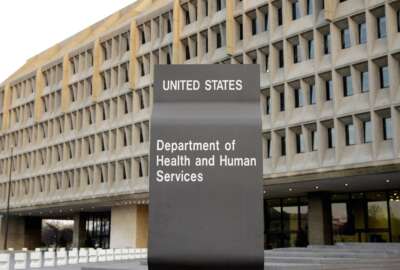VA to remain ‘very discerning’ on health care hiring, calls on Congress to address $12B shortfall in December
The VA expects to grow its health care workforce to approximately 404,000 total employees next year, if Congress approves supplemental funding.
The Department of Veterans Affairs is calling on Congress to address a $12 billion budget shortfall by the end of the year, to ensure it can keep providing health care to a record number of veterans.
Lawmakers passed a continuing resolution Wednesday that extends current spending levels through Dec. 20.
The CR gives Congress more time to work out an in-depth spending plan for fiscal 2025. If not, lawmakers will have to pass another stopgap funding bill by the deadline to avoid a government shutdown.
VA Secretary Denis McDonough said he’s hoping Congress will address the VA’s request for $12 billion in supplemental funding in a comprehensive spending deal for fiscal 2025.
“We’re hopeful to see an anomaly there. In the meantime, we’ll continue to provide world-class care, and we will continue to be very discerning about hiring decisions,” McDonough told reporters at a press conference Thursday.
Lawmakers approved a $3 billion supplemental funding bill last week that would allow the VA to keep making disability compensation and pension payments on time to 7 million veterans and their survivors.
Congressional Republicans, however, expressed frustration that VA officials warned about its budget shortfalls in July, months after submitting a fiscal 2025 budget request and appearing before committees to defend it.
House VA Committee Chairman Mike Bost (R-Ill.) told the VA in July that increased hiring at the Veterans Health Administration “above all,” contributed to the $12 billion budget shortfall.
McDonough said the VA “took those concerns to heart” about staffing, but determined VHA will need to keep hiring to provide more care to more veterans.
The VA is providing record levels of health care and benefits to veterans under the PACT Act, which expands eligibility for veterans exposed to toxic substances during their military service.
VHA is on track to provide 130 million appointments to veterans by the end of fiscal 2024 — beating last year’s record of 120 million appointments.
“We’ve determined that to continue to provide the kinds of care that we want to provide, we should have a different end-strength number,” McDonough said. “So, we’re hopeful that Congress will help us get to that outcome, when they take up the full-year funding for VA and other agencies at the end of December.”
‘Tougher budget years’ lie ahead
McDonough said that at this point, the VA expects to grow its health care workforce to approximately 404,000 total employees, if Congress approves the supplemental funding.
“Now those numbers are going to be constantly updated. And especially with the end of the fiscal year, we’ll have some accounting to do over the course of the next several weeks, so we’ll take a hard look at that,” McDonough said.
The VA’s latest hiring forecast is a different picture than its FY 2025 budget request, which projected 383,000 employees for VHA’s workforce — a reduction of about 10,000 positions.
“We said, ‘Look, we think it works, but if we need more, we’ll come back to you,’’ McDonough said, summarizing VA’s conversations with Congress.
“I said the one thing we will not do is we will not stop the outreach to the veterans … because this is their care that they’ve earned, and we have to make it available. So, if we need more providers to make it available, we’ll let you know, and we’ll ask for more money. Well, we did that.”
VHA initially planned on “net-zero growth” for its workforce this year, after the agency hired more than 61,000 employees in FY 2023 — its fastest rate of growth in 15 years. However, VHA still grew its workforce by more than 2% this year.
Rather than keep hiring in significant numbers, VHA focused this year on increasing the productivity of its current health care workforce.
“Because of what we anticipate will be increased demand from veterans, and … in light of the budget agreement from last year, with the introduction of the caps, there’s going to be tougher budget years, so we have to be doubly careful about that,” McDonough said.
Through its “access sprints,” the agency increased the number of veterans that each VA provider sees for appointments, and offered night and weekend clinics.
McDonough said the VA is seeing “strong performance,” decreased wait times and increased access to primary care, mental health care and specialist care.
“We’re looking at productivity because of the intensity of the situation we find ourselves in, and it’s not meant to be a characterization of them or their performance,” McDonough said about VA clinicians.
“I have every confidence that our providers are going to step up on this as well,” he said.
Under the PACT Act, more than 4.7 million veterans have applied for benefits, and more than 747,000 veterans have enrolled in VA health care.
“President Biden and Secretary McDonough gave us a mandate on day one, reach out to every single veteran and every survivor who is newly eligible for care and benefits, and make sure they get what they earned,” Assistant Secretary for Public and Intergovernmental Affairs Adam Farina told reporters. “Since then, we’ve embarked on the largest outreach campaign in the history of VA.”
For VA’s new EHR, ‘performance is the name of the game’
In one of its latest reports, the VA’s inspector general office found that between October 2020 and March 2024, its new Electronic Health Record experienced 826 “major performance incidents” — including outages, performance degradations and incomplete functionality.
The new EHR is operating at five VA locations, as well as a health care facility in Chicago it jointly operates with the Defense Department.
McDonough said, in response to the IG report, that “there are steps in place to make sure that the veteran and their access to care does not suffer as a result of the deployment of the new system.”
“We do know that it’s been the case in VA, as it has been the case in other health care systems, that the initial deployments of new EHRs lead to productivity loss. We try to make up that with staffing enhancements that then have an impact on budgeting, VISN by VISN,” he added.
VA renewed its multibillion-dollar EHR contract with Oracle-Cerner in May 2023, with new terms meant to hold the vendor accountable for persistent outages.
“In the course of the last couple of years, we have highlighted system reliability as a key measurement, and we’ve ensured that there are ways for us to extract penalties from the contractor when the performance is not what veterans are right to expect it to be,” McDonough said. “This is a very valuable measure. It’s a measure that we take very seriously, and it’s a measure that we’ve now built into the contract, so that everybody understands that performance is the name of the game, because the whole purpose of doing this is to improve veteran outcomes.”
Copyright © 2025 Federal News Network. All rights reserved. This website is not intended for users located within the European Economic Area.
Jory Heckman is a reporter at Federal News Network covering U.S. Postal Service, IRS, big data and technology issues.
Follow @jheckmanWFED






